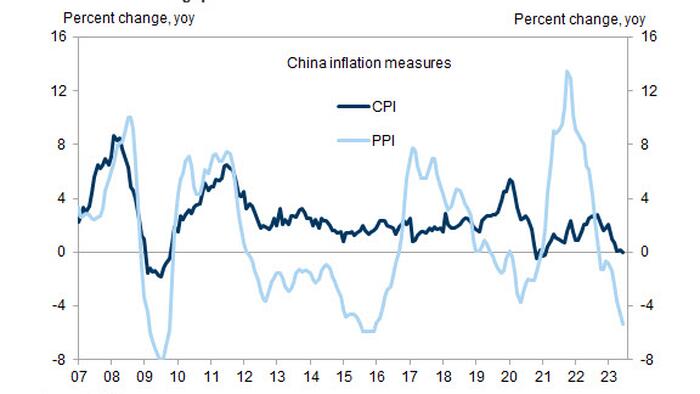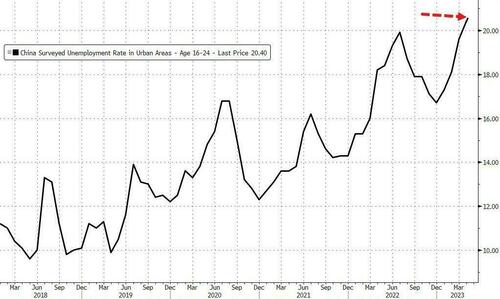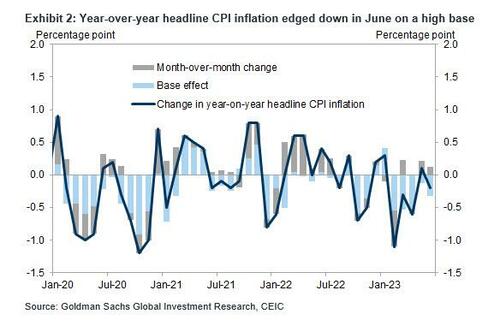


It's not just record youth unemployment and the threat of rampant social unrest as tens of millions of bored, unemployed and restless teenager and young adults take to the streets to express their frustration with a stagnating economy, that is breathing down Beijing's neck...
... demanding that Xi spike the economy with a few extra trillion in fiscal stimulus, record debt levels be damned: the latest inflation data released overnight shows that China is now facing, another far more familiar bogeyman: deflation.
According to China's National Bureau of Statistics, both CPI and PPI missed expectations, as China’s CPI dropped to unchanged in June (from 0.2% in May) the weakest rate since February 2021, when slumping pork costs dragged on the index, while PPI or factory-gate prices tumbled a whopping 5.4% YoY, the biggest drop since December 2015.
The collapsing prices fueled fresh concerns about deflation risks and added to speculation about potential economic stimulus.
Some more details on the reported numbers, all of which missed expectations.
The continued decline in the two gauges add to evidence that the recovery is weakening, with concerns about deflation weighing on confidence. That’s likely to spur more speculation about what potential stimulus may be in the cards to shore up the economy.
A key drag on consumer prices last month was pork prices. The cost of meat — a staple in the Chinese diet — fell 7.2% in June from a year earlier. That was more than May’s 3.2% decrease. The government has been trying to put a floor under pork price declines, saying last week that it would buy more pork for state reserves to boost demand.
Some more observations on the data, courtesy of Goldman (full report available to professional subs):
Putting it all together, Zhang Zhiwei, chief economist at Pinpoint Asset Management said that “The risk of deflation is very real."
Producers have already spent months contending with lower commodity prices and weak demand at home and abroad. If consumers and businesses continue to hold back from spending or investment in the hopes of prices getting lower that could lead to a self-fulfilling price dropping spiral.
And since China can ill avoid a third contraction in as many years, the case for a stimulus now looms large, and alongside it, another surge in commodity prices.
"Today’s data certainly argues for more policy easing, which policymakers are already doing, but only in a measured manner," said Michelle Lam, Greater China economist at Societe Generale SA.
There is another reason why another powerful stimulus is now just a matter of time: aside from a brief period of deflation in early 2021, China hasn’t experienced prolonged consumer price deflation since 2009 amid the global financial crisis. Back then, Beijing introduced a 4 trillion yuan ($553 billion) stimulus package focused on infrastructure and upgrading industry. While that plan bolstered growth at the time, it also led local governments to borrow more than they were legally allowed, causing debt to balloon.
That said, the scope for policy to stem the threat of deflation is more limited this time around, in part given concerns about debt risks (see "Fueled by Long Credit Binge, China’s Economy Faces Drag From Debt Purge"). It's why most measures to support the economy have been limited, with the central bank cutting a key policy interest rate last month by only a small amount. The government has also extended tax breaks for buyers of electric cars.
“It’s very unlikely for the government to introduce extraordinarily strong macro policies,” said Bruce Pang, chief economist at Jones Lang Lasalle Inc. He added that leaders are emphasizing “high-quality growth that’s stable and strikes a balance between economic structural adjustment and risk prevention.”
As Bloomberg reminds us, premier Li Qiang spoke last week with some Chinese economists about potential aid, though he emphasized that policies would be “targeted, comprehensive and well-coordinated” — reinforcing expectations that stimulus would not be massive in size.
Perhaps... but if China's economy and property markets continue to slide, and if deflation becomes a persistent threat to growth, Beijing will have no other choice.


